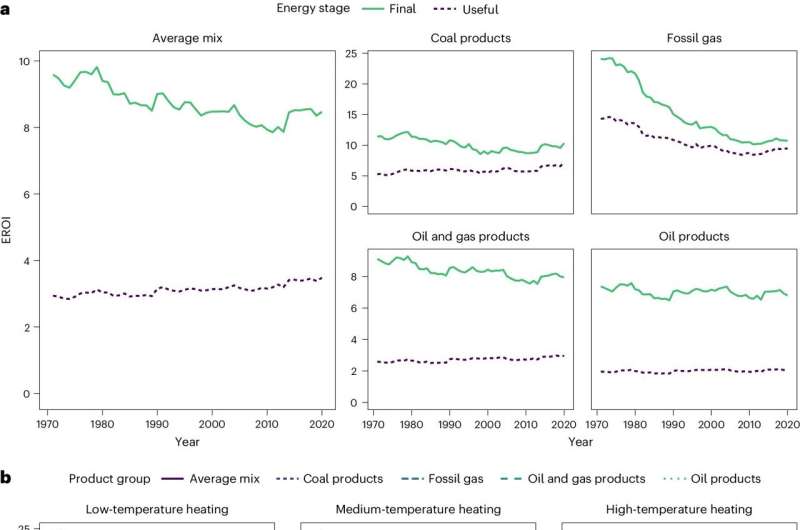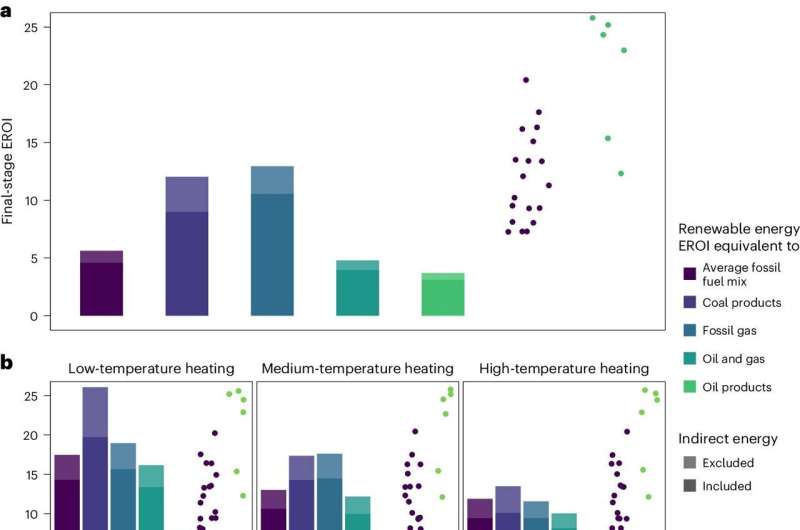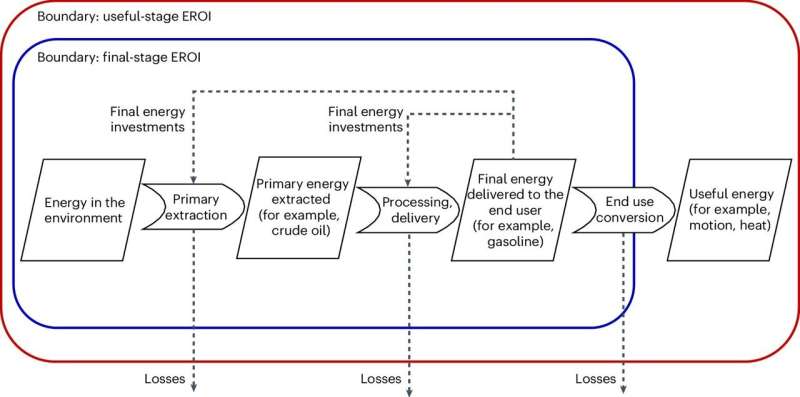Transitioning to renewable energy systems might not entail a decline in net energy – Tech Xplore
Transitioning to renewable energy systems might not entail a decline in net energy
This article has been reviewed according to Science X’s
editorial process
and policies.
Editors have highlighted
the following attributes while ensuring the content’s credibility:
fact-checked
peer-reviewed publication
trusted source
proofread
Energy researchers have been trying to understand the implications of a transition to fully renewable energy for decades. Some past studies suggested that technologies to generate energy from renewable energy sources, such as solar panels and wind turbines, might not generate as much net energy (i.e., the energy remaining after accounting for the energy consumed to generate power) as their long-standing fossil fuel-reliant counterparts.
Researchers at University of Leeds recently carried out a study aimed at further investigating the extent to which this idea is true, by comparing the estimated net energy produced by burning fossil fuels with that produced by sustainable energy technologies. The findings of their analyses, published in Nature Energy, suggest that the transition towards renewable energy systems might not actually entail a decline in net energy.
“For a given energy system, the energy return on investment (EROI) refers to the ratio of the energy delivered to society divided by the energy invested,” Emmanuel Aramendia, co-author of the paper, told Tech Xplore. “A common and enduring view is that fossil fuels have higher EROIs than renewable energy and therefore return substantially more net energy to society than renewable energy systems. This view questions the possibility of a low-carbon transition without drastic reductions in living standards.”
Previous studies typically quantified the energy returns of fossil fuels at the primary stage of extraction (i.e., the energy extracted from oil wells or at other sites). In contrast, the returns of renewable energy systems are typically quantified at the final energy stage (i.e., the energy delivered to users in the form of electricity).
These studies suggest that fossil fuels produce significantly more usable energy than renewable energy sources. Recent work, including a paper published in Nature Energy in 2019, found that when comparing energy returns at the final energy stage, the energy returns of fossil fuels and renewables were not that far apart. However, even these works did not take into consideration factors that can only be estimated by conducting analyses at the useful energy stage.

“Previous work has so far failed to account for the fact that renewable energy systems like solar PV and wind power deliver electricity, which is on average used with much higher final-to-useful efficiencies (i.e., the efficiency with which the final energy carrier is converted into an energy flow valuable to society, e.g. heat, mobility, etc.) than fossil fuel-based carriers,” Aramendia said.
“As an example, the efficiency of an internal combustion engine (e.g. gasoline or diesel vehicle) is in the range 25-35%, while the efficiency of an electric car is around 80%. In our work, we expand the boundary of analysis to the useful energy stage to account for the effects of final-to-useful efficiencies.”
As part of their recent study, Aramendia and his colleagues analyzed data collected by the International Energy Agency, with the aim of determining the direct energy use (i.e., energy use in situ) of the fossil fuel industry. They also used the Exiobase input output model, a database containing monetary and energy-related data sourced from 43 countries worldwide, to determine the indirect use of fossil fuel-produced energy (i.e., energy use in the supply chain).
“This provided us with the final stage EROI of fossil fuels, over the period 1971-2019,” Aramendia explained. “We then used an energy database recently developed at the University of Leeds describing energy flows until the useful energy stage, and therefore explicitly representing the (final-to-useful) efficiencies of energy carriers. Using the average efficiencies from the database, we could determine the useful stage EROI of fossil fuels.”
Finally, the researchers compared the energetic performance of fossil fuels with that of renewable energy systems (i.e., photovoltaics and wind turbines). Their comparison relied on the EROI values they had identified for fossil fuels, adjusted for the effects of final-to-useful efficiencies and the EROI values they derived from existing literature focusing on solar panels and wind power.

“Our work dismisses a persistent narrative according to which fossil fuels have much higher net energy returns than renewables, and according to which the transition to renewables can only be accompanied by a drop in living standards,” Aramendia said. “Indeed, our findings show that the EROI of fossil fuels is on average very low at the useful stage (3.5:1, against 8.5:1 at the final stage), which is due to the very low average final-to-useful efficiency of fossil fuels.”
The results of the analyses carried out by this team of researchers strongly question previous arguments about the high net energy performance of fossil fuels. Instead, they suggest that renewable energy systems could ultimately provide society with similar levels of net energy, particularly when quantified at the useful energy stage.
“Investing energy into building the renewable energy infrastructure is highly beneficial to society, not only in terms of climate change mitigation, but also in terms of future energy availability,” Aramendia said. “The energetic performance of renewables outperforms that of fossil fuels. This is particularly relevant in the context of a rapidly growing global energy demand, particularly in developing countries, where renewables have the highest potential to deliver desired increases in energy demand.”
The findings gathered by Aramendia and his collaborators could inspire governments and policy-makers to continue introducing measures that support the deployment of renewable energy systems. In addition, they could promote new initiatives facilitating the deployment of these systems in developing and lower-income geographical regions.
“Future research should look at identifying mitigation pathways that ensure both a quick phase-out of fossil fuels and a sufficient net energy supply to deliver good living standards for all,” Aramendia added. “Aspects that require close attention are intra- and international inequality in terms of access to energy services, and the initial, upfront energy investments required for the energy transition, which may temporarily reduce the net energy available to society in the early stages of the transition.”
More information:
Emmanuel Aramendia et al, Estimation of useful-stage energy returns on investment for fossil fuels and implications for renewable energy systems, Nature Energy (2024). DOI: 10.1038/s41560-024-01518-6
© 2024 Science X Network
Citation:
Transitioning to renewable energy systems might not entail a decline in net energy (2024, June 15)
retrieved 15 June 2024
from https://techxplore.com/news/2024-06-transitioning-renewable-energy-entail-decline.html
This document is subject to copyright. Apart from any fair dealing for the purpose of private study or research, no
part may be reproduced without the written permission. The content is provided for information purposes only.
Explore further


